7 Effective Ways To Increase Stamina For Football
Step into the field confidently and prepared with proper training, exercises, and diet.

Image: shutterstock
If you love playing football, you must increase your muscle endurance. But how to increase stamina for football? Well, training in the field is the best way to improve stamina, agility, speed, and game technique and strategy. There also are certain workouts that can help you get to that level of physical fitness when you can compete with 100% confidence. If you love an energetic sport like football where teamwork and stamina is required, this article is for you. Read on to know how to increase stamina for playing football. Scroll down!

In This Article
How To Increase Stamina For Football?
Good stamina when playing football enhances the ability to sustain prolonged physical activity on the field. It helps football players stay agile throughout the game. Whether it is sprinting after the ball or challenging opponents midfield, the right stamina helps players perform their best and outlast their opponents. Here are some ways in which you can increase your stamina naturally and play the beautiful game:
1. Practice Specific Exercises:
- Cardiovascular Exercises: Practice cardiovascular exercises or ‘aerobics’ (swimming, rope jumping, running, stair-stepping, jogging, skipping, cycling, rowing, etc.) at least for 30 to 50 minutes every day. It can boost stamina by increasing your aerobic capacity to a great extent (1).
- Circuit Training: Weight-based circuit training (sit-ups, push-ups, lunges, squat jumps, etc.) can help you a lot in developing muscle strength, thereby improving your endurance (2). Exercising for 1 minute at each of the 10 to 20 stations of a circuit is considered to be enough.
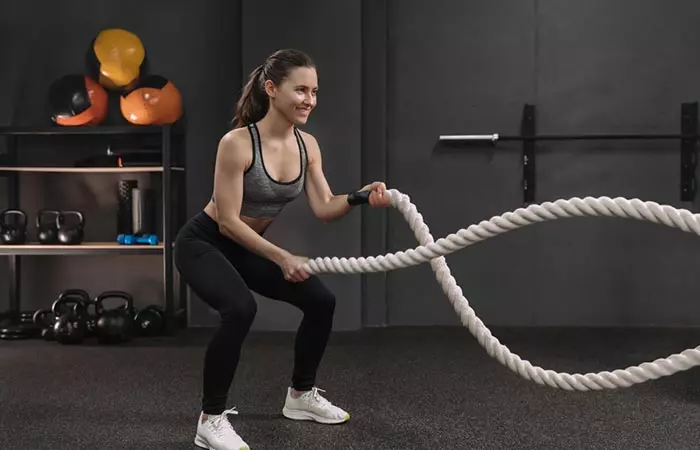
- Plyometric Exercises: It has been found that plyometric exercises (one leg jumps, box jumps, burpees, stair hops, depth jumps, medicine ball throws, and other similar quick explosive movements), especially the weighted ones, can increase the energy and resilience of a football player significantly (3). They may enhance their speed, giving them an edge during critical moments in the game.
- Stretching: Stretch your body before and after exercises regularly. It will not only build your stamina, but also keep you away from injuries.
2. Train Yourself Properly:
- Sprinting: It is crucial to train your body beforehand, so that you can sprint-jog-sprint during the game as fast as possible. Performing a cycle of 15-20 yards of sprinting (including the recovery time) every day can help you immensely to enhance your stamina. You can also practice sprint drills with additional resistance (wearing weighted pants or vests) to make the most of your training (4).
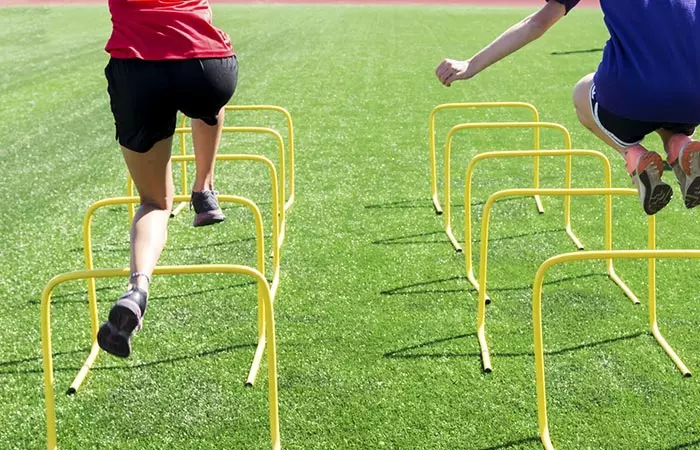
- Speed Endurance Runs: This particular training is necessary for increasing your capacity of moving over different distances fast and efficiently. As a result, your level of endurance will also go higher.
Ron, a blogger and football enthusiast, shares on his blog: “I gradually improved my stamina and have become a hardworking player on the field. I run around closing down, putting pressure and chasing for the ball. I run up and down the field to add my presence to support both the attack and defense. And just keep running, running, and running (i).”
- Fartlek Training: This is a modified form of speed endurance run that mimics the stop-and-start nature of a football match. It helps the player move for a constant duration by altering his or her speed accordingly. It is a randomized version that provides lots of energy and stamina to the trainee. It may enhance both anaerobic and aerobic capacities, which are important for football players who need to switch between intense sprints and recovery phases.
- Soccer-Ball Drill: It is one of the most effective stamina training options for football players. As it makes use of the football itself, you can strengthen your ball control as well as ball possession skills along with heightening endurance level.
 Did You Know?
Did You Know?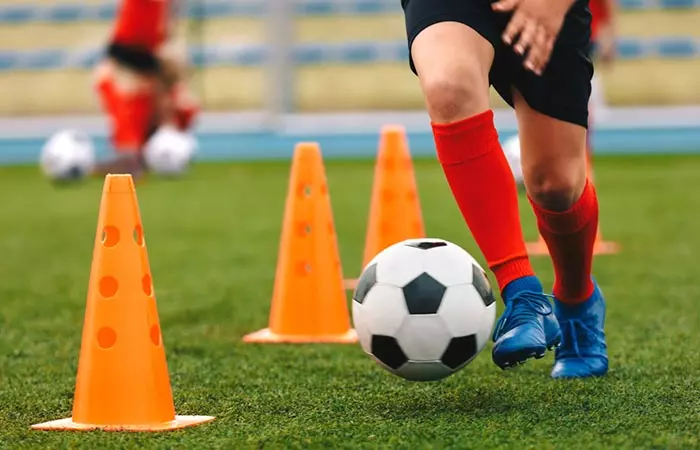
3. Consume Well-Balanced Diet:
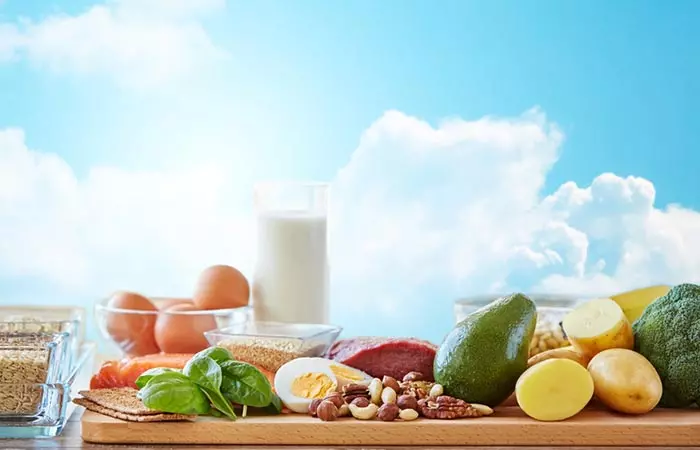
Healthy eating is undoubtedly essential for increasing stamina, be it in football or any other physical game. Strictly follow a well-balanced diet that is high in carbs, low in fats, and contains adequate protein. Carbohydrates are essential for energy and may help improve athletic performance, while protein consumption helps in muscle protein synthesis, which is needed for muscle growth and recovery (5). Eat at least 6 times (3 big and 3 small meals) or more a day to get sufficient nutrition. Stay away from junks, processed foods, sugary items, soda, etc. Also, try to indulge in real whole foods instead of having power bars, energy drinks and nutritional supplements (5).
According to a study conducted with Gaelic football players, CHO, protein, and fat consumption should have a proper balance. The study found that the mean dietary intake of fat was marginally greater than the recommended intake. However, the data provides a relatively accurate macronutrient intake necessary for football players. Check out the graph below to learn more.

Macronutrient intake of football players on various types of training
Source: Dietary Intake and Energy Expenditure Assessed during a Pre-Season Period in Elite Gaelic Football Players4. Stay Hydrated:

Drink plenty of water to keep yourself hydrated. If your body cells get dehydrated, you will feel low on energy and it will take a toll on your stamina as well as performance. Fatigue, less frequent urination, or dark urine are some signs of dehydration. So try and consume lots of water throughout the day and keep a sufficient number of bottles with you during the match.
5. Give Yourself Enough Rest:
Take enough rest before two performances. Every player needs to sleep anywhere between 7 and 9 hours daily at night. Nocturnal and consolidated sleep is considered to be better than broken chunks of sleep time for your body to rejuvenate and recover completely. Proper rest and recovery will help you focus better and get enough stamina to perform optimally the next day (6).
6. Do Not Over-Practice:
While perseverance and determination to practice are essential in sports, remember not to over-train yourself. If you exercise a lot or practice each and every day, you will be totally drained out of energy and are more prone to injury, affecting your level of stamina considerably. It is vital that you take at least a couple of days off in the span of one week.
7. Be Positive:
Always think positive and take positive steps to reduce mental stress. Mental fatigue and stress can reduce your stamina (7). So, keep self-motivating and be positive and see your stamina and performance improve.
Key Takeaways
- Building up stamina for football requires a proper diet, adequate hydration, and physical exercises to enhance endurance and resistance.
- Stretching techniques help in muscle conditioning and improving flexibility, while cardiovascular exercise helps in improving strength.
- Eating a high carb and low-fat diet is crucial for maintaining energy during pre and post-gaming and training sessions.
- Getting 7 to 9 hours of sleep and avoiding the intake of harmful substances aid in performance improvement.
Infographic: Best Circuit Training Exercises To Increase Stamina For Football
The above article gives you a range of methods and exercises that may help you improve your strength, endurance, and stamina. If you’re looking for an interesting training method that can help you target multiple muscles, look no further.
Check out the infographic below to learn more about the circuit training method and what to do along the way to ensure you get the best results from this workout. Illustration: StyleCraze Design Team
 Quick Tip
Quick TipFootball is quite a demanding sport in terms of stamina, endurance, and physical fitness. Exercising and training are effective ways to increase stamina for football. Do cardiovascular exercises regularly to increase your aerobatic capacity, circuit training to strengthen your muscles, and plyometric exercise to build your energy levels. Doing sprints, speed endurance runs, and fartlek training can also help build stamina and prepare your body for football. However, all this physical activity must be complemented with proper rest or sleep, enough hydration, good mental health, and a good and well-balanced diet including energy-giving foods to boost stamina. So, pull up your socks and start training!
Frequently Asked Questions
How much stamina does a footballer have?
Footballers have really high stamina, strength, and endurance.
Can you build stamina in 2 weeks?
Yes, consistently engaging in different physical exercises daily can help you build stamina steadily in 2 weeks.
Does milk decrease stamina?
No, studies suggest that milk may have an impact on endurance and recovery of muscle function (9).
Which fruit gives more stamina?
Bananas and citrus fruits may help increase physical endurance and reduce fatigue (10), (11). They contain nutrients like carbs, vitamin C, fiber, and potassium that may help regulate digestion and make you feel fuller. They also help reduce free radical production and fatigue and protect the muscles from damage.
Illustration: Effective Ways To Increase Stamina For Football

Image: Stable Diffusion/StyleCraze Design Team
Discover how to improve stamina and combat fatigue in this empowering video. Explore effective strategies and lifestyle changes to boost endurance and energy levels.
Personal Experience: Source
StyleCraze's articles are interwoven with authentic personal narratives that provide depth and resonance to our content. Below are the sources of the personal accounts referenced in this article.
i. Advice For People Who Have No Talent But Want To Be Good At Somethinghttps://ronnyeo.wordpress.com/2013/04/08/advice-for-people-who-have-no-talent-but-want-to-be-good-at-something-lessons-from-futsal/
References
Articles on StyleCraze are backed by verified information from peer-reviewed and academic research papers, reputed organizations, research institutions, and medical associations to ensure accuracy and relevance. Read our editorial policy to learn more.
- Aerobic vs anaerobic exercise training effects on the cardiovascular system
https://www.ncbi.nlm.nih.gov/pmc/articles/PMC5329739/ - Effects of a Circuit Training Program on Muscular and Cardiovascular Endurance and their Maintenance in Schoolchildren
https://www.ncbi.nlm.nih.gov/pmc/articles/PMC3796833/ - Effects of plyometric training on soccer players
https://www.ncbi.nlm.nih.gov/pmc/articles/PMC4950532/ - Six Sessions of Sprint Interval Training Improves Running Performance in Trained Athletes
https://www.ncbi.nlm.nih.gov/pmc/articles/PMC5839711/ - Role of nutrition in performance enhancement and postexercise recovery
https://www.ncbi.nlm.nih.gov/pmc/articles/PMC4540168/ - The Extraordinary Importance of Sleep
https://www.ncbi.nlm.nih.gov/pmc/articles/PMC6281147/ - Stress in Academic and Athletic Performance in Collegiate Athletes: A Narrative Review of Sources and Monitoring Strategies
https://www.frontiersin.org/journals/sports-and-active-living/articles/10.3389/fspor.2025.00042/full - Exploring the therapeutic effects of yoga and its ability to increase quality of life
https://www.ncbi.nlm.nih.gov/pmc/articles/PMC3193654/ - Impact of cow’s milk intake on exercise performance and recovery of muscle function: a systematic review
https://www.researchgate.net/publication/332888708_Impact_of_cow’s_milk_intake_on_exercise_performance_and_recovery_of_muscle_function_a_systematic_review#pfb - Bananas as an Energy Source during Exercise: A Metabolomics Approach
https://www.ncbi.nlm.nih.gov/pmc/articles/PMC3355124/ - Daily vitamin C consumption and fatigability
https://pubmed.ncbi.nlm.nih.gov/765389/
Read full bio of Gabrielle Kane
Read full bio of Kushneet Kukreja
Read full bio of Arshiya Syeda
Read full bio of Moksha Gandhi



















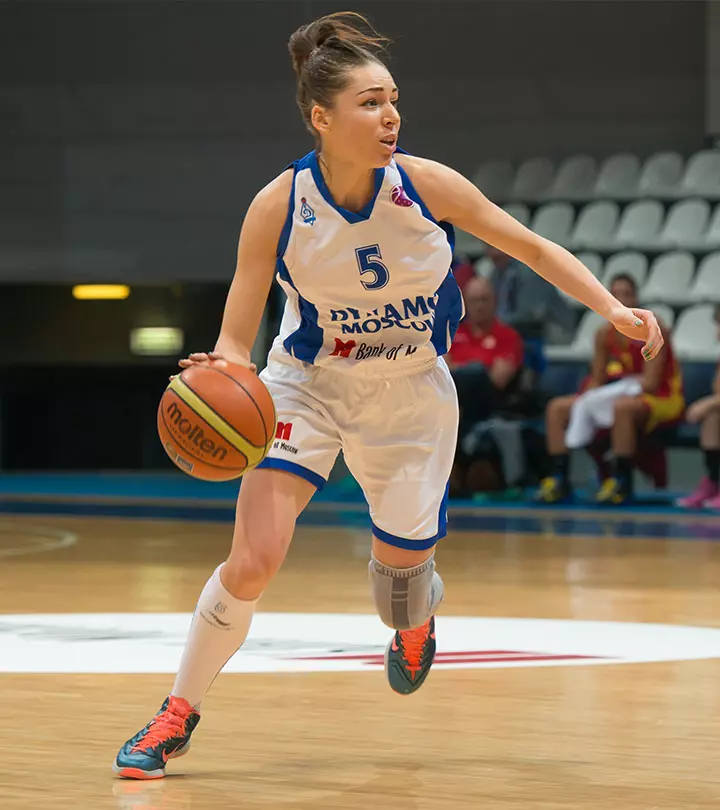






Community Experiences
Join the conversation and become a part of our empowering community! Share your stories, experiences, and insights to connect with other beauty, lifestyle, and health enthusiasts.